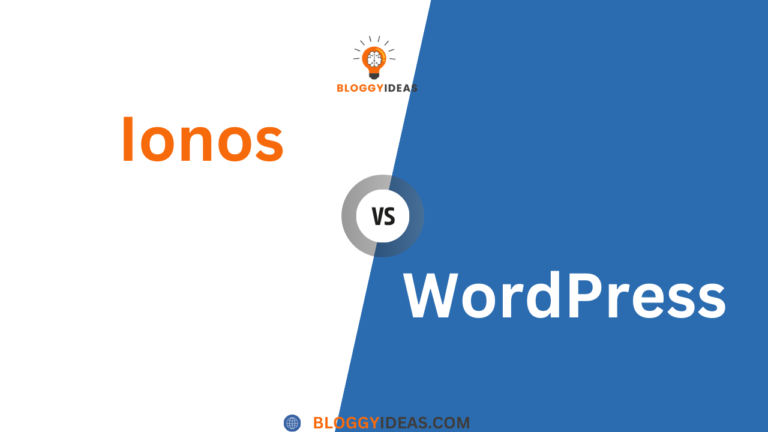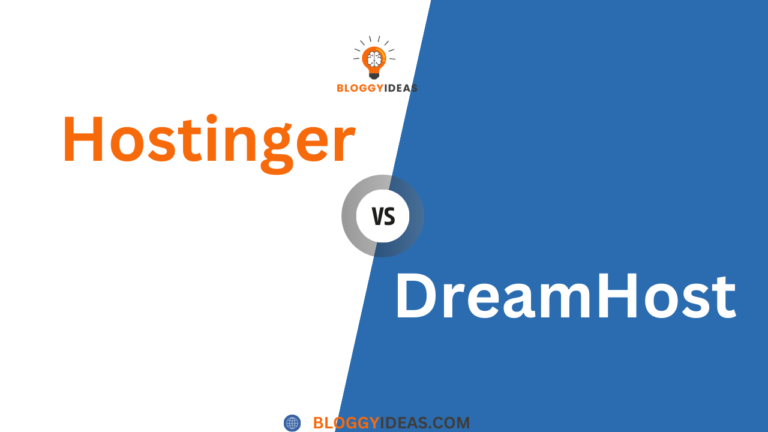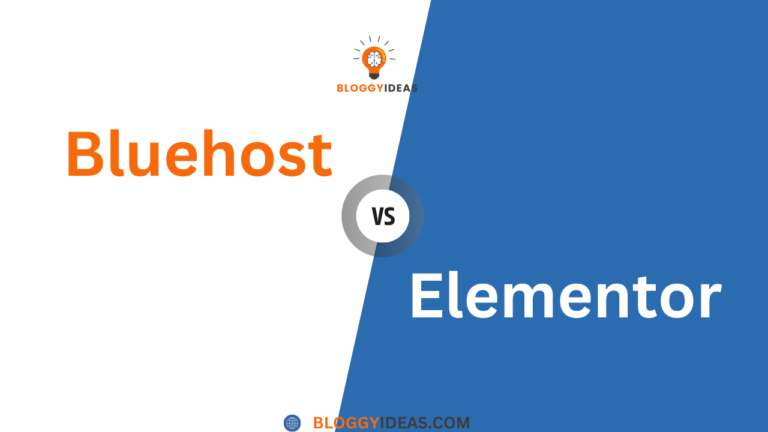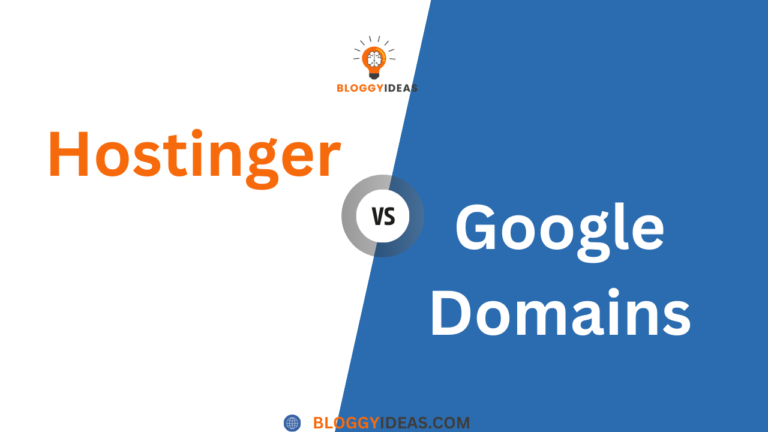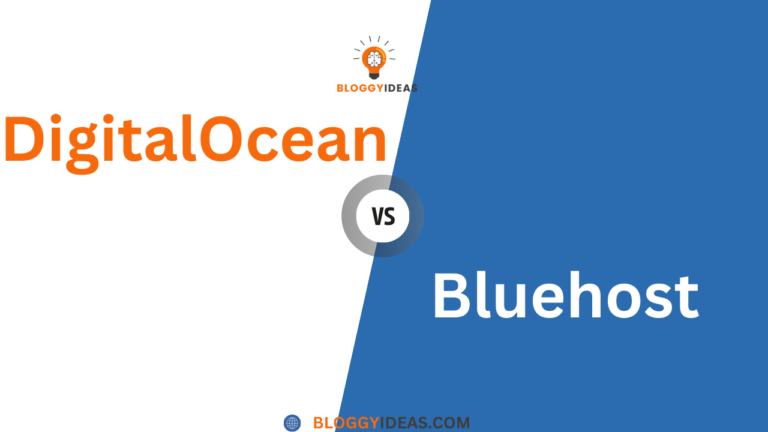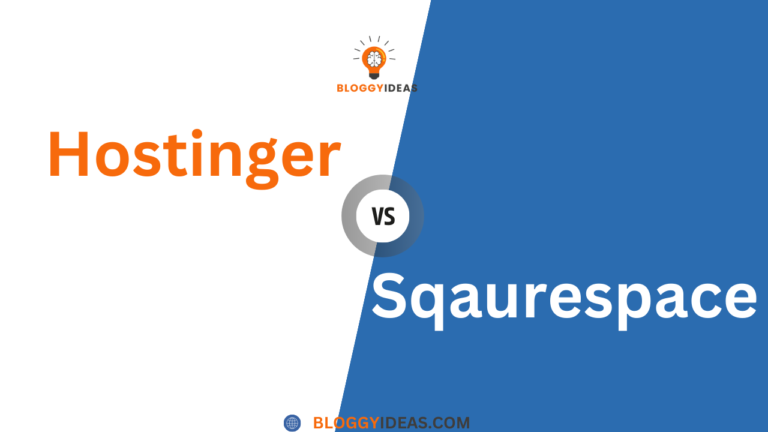Hostinger vs Namecheap: Which Should You Choose
“Quick Overview” In the ever-expanding realm of web hosting, selecting the right provider is pivotal for the success and smooth operation of your online presence. Two popular contenders in this arena are Hostinger and Namecheap.
Hostinger, known for its competitive pricing and performance, faces off against Namecheap, a domain registrar turned hosting powerhouse. In this comprehensive comparison, we delve into the nuances of each provider’s offerings to help you make an informed decision.
From pricing and performance to customer support and security, join us as we dissect Hostinger vs Namecheap to determine which web hosting solution aligns best with your needs.
Pricing and Plans
Explore the cost-effective hosting solutions offered by Hostinger and Namecheap, comparing entry-level packages and assessing the value they provide. From budget-friendly options to feature-rich plans, find the perfect fit for your website needs.
Overview of Pricing Structures for Hostinger and Namecheap
Hostinger and Namecheap both offer a variety of hosting plans tailored to different needs and budgets. Hostinger is known for its affordability, often providing cost-effective solutions for individuals and businesses alike.
Their pricing structure typically includes shared hosting, cloud hosting, VPS hosting, and more, with options ranging from budget-friendly to premium packages.
On the other hand, Namecheap also boasts competitive pricing, leveraging its reputation as a domain registrar to offer attractively priced hosting solutions. Their plans cater to beginners, small businesses, and larger enterprises, with a focus on simplicity and value.
Top Recommended Resources for Success
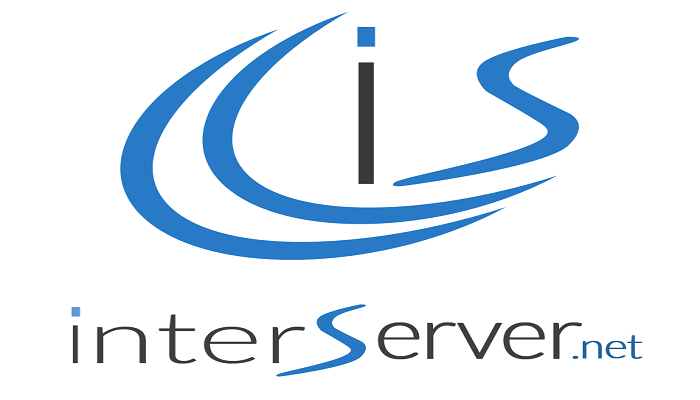
The Best Web Hosting Services at 20x Speeds
InterServer
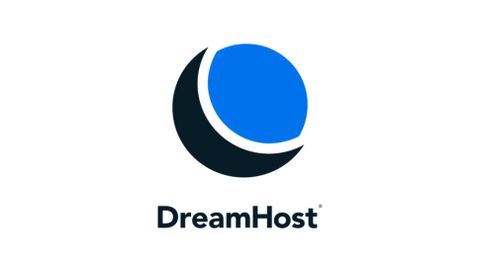
The Best Web Hosting Services at 20x Speeds
Dream Host

The Best Web Hosting Services at 20x Speeds
Bluehost
Comparison of Entry-Level Plans
- Hostinger
- Hostinger’s entry-level plan, often branded as “Single Shared Hosting,” is designed for individuals or small websites looking to establish an online presence affordably.
- It typically includes features such as a single website, limited storage space, bandwidth, and email accounts.
- Hostinger’s entry-level plan may lack some advanced features but serves as an excellent starting point for those on a tight budget or with minimal hosting needs.
- Namecheap
- Namecheap’s entry-level plan, commonly referred to as “Stellar,” caters to beginners and small website owners seeking reliable hosting without breaking the bank.
- The Stellar plan typically offers features like hosting for up to three websites, unmetered bandwidth, 20GB SSD storage, free website builder, and a free domain name for the first year.
- While Namecheap’s entry-level plan may come with more generous resources compared to Hostinger’s basic offering, it still maintains an affordable price point suitable for individuals and small businesses.
Features Included in Each Plan
- Hostinger
- Hostinger’s plans, including the entry-level option, often come with essential features such as a user-friendly control panel (usually cPanel or custom-built), one-click installer for popular applications like WordPress, free SSL certificate, and 24/7 customer support.
- Depending on the plan, Hostinger may offer additional features like daily backups, enhanced security measures, and more robust performance optimization tools.
- Namecheap
- Namecheap’s entry-level plan, Stellar, encompasses features aimed at simplifying website management for beginners. These features may include a drag-and-drop website builder, cPanel control panel, free website migration, and a domain name registration or transfer.
- Like Hostinger, Namecheap also emphasizes security and reliability, offering features such as DDoS protection, SSL certificate options, and automated backups.
Value for Money Analysis
Comparing the entry-level plans of Hostinger and Namecheap, it’s evident that both providers offer excellent value for money in different ways. Hostinger shines with its ultra-low pricing, making it incredibly accessible for individuals and startups on a tight budget. However, Namecheap’s Stellar plan provides a more comprehensive package with additional resources and features, albeit at a slightly higher price point.
When assessing the value for money, consider your specific needs and priorities. If affordability is paramount and you can make do with fewer resources, Hostinger’s budget-friendly plans may suffice. Conversely, if you require a bit more flexibility and scalability without compromising on quality, Namecheap’s Stellar plan might be the better investment.
Ultimately, the value for money depends on factors such as your website’s size, expected traffic, technical requirements, and long-term growth strategy. Take the time to evaluate these factors against the features and pricing of each provider to determine which option aligns best with your objectives and budget constraints.
Performance and Uptime
Performance and uptime are crucial metrics when evaluating web hosting providers. Both Hostinger and Namecheap boast impressive server performance and reliable uptime statistics, ensuring your website remains accessible and responsive to visitors around the clock.
Discussion on Server Performance and Speed
When it comes to web hosting, server performance and speed play a crucial role in determining the user experience and search engine rankings of your website. Hostinger boasts of high-performance servers optimized for speed, utilizing technologies like SSD storage and LiteSpeed caching to ensure swift loading times.
Similarly, Namecheap emphasizes its commitment to performance, offering servers equipped with the latest hardware and optimized software configurations. Both providers implement techniques such as content delivery networks (CDNs) and server-side caching to enhance website speed and responsiveness.
Uptime Statistics and Reliability
Uptime reliability is paramount for any website, as downtime can lead to lost revenue and tarnished reputation. Hostinger guarantees an impressive uptime of 99.9%, backed by robust infrastructure and proactive monitoring systems.
Namecheap also maintains a strong uptime track record, with many users reporting minimal downtime incidents. It’s essential to consider the uptime guarantees provided by each provider and their respective compensation policies in case of any service disruptions.
Data Center Locations and Infrastructure
The geographical location of data centers can significantly impact the performance and accessibility of your website for users around the world. Hostinger boasts a global network of data centers strategically located in multiple regions, including the United States, Europe, Asia, and more.
This enables Hostinger to offer low-latency connections and high-speed access to visitors from various geographic locations. On the other hand, Namecheap operates data centers primarily in the United States and the United Kingdom, with plans for expansion. Evaluating the proximity of data centers to your target audience can help optimize website performance and reduce latency.
User Experiences and Reviews
User experiences and reviews provide valuable insights into the real-world performance and reliability of web hosting providers. Many Hostinger users commend its fast loading times, reliable uptime, and responsive customer support.
Similarly, Namecheap receives praise for its user-friendly interface, competitive pricing, and dependable hosting services. However, it’s essential to consider a diverse range of user experiences, including both positive and negative feedback, to make an informed decision.
Additionally, third-party review platforms and forums can offer unbiased perspectives on the performance and uptime of Hostinger and Namecheap hosting services.
Features and Tools
Both Hostinger and Namecheap offer a rich array of features and tools to empower website owners. From intuitive control panels to one-click installations for popular applications like WordPress, their offerings include essential functionalities designed to streamline website management and enhance user experience.
Comparison of Features Offered by Hostinger and Namecheap
When it comes to web hosting, the features provided by a hosting provider can significantly impact the functionality and performance of your website. Let’s compare the key features offered by Hostinger and Namecheap to help you determine which one aligns better with your requirements.
- Disk Space and Bandwidth
- Hostinger typically offers generous allocations of disk space and bandwidth across its hosting plans, allowing ample room for website growth and traffic.
- Namecheap also provides competitive disk space and bandwidth allowances, ensuring that your website can accommodate visitors without experiencing slowdowns or limitations.
- Website Builders
- Hostinger offers a user-friendly website builder with drag-and-drop functionality, enabling even those without technical expertise to create professional-looking websites.
- Namecheap provides access to website builders such as WordPress and Weebly, empowering users to build customized websites tailored to their preferences.
- Domain Management
- Both Hostinger and Namecheap offer domain registration services, allowing you to seamlessly manage your domain names alongside your hosting account.
- Namecheap, as its name suggests, specializes in domain registration and provides extensive domain management tools, including DNS management and WHOIS privacy protection.
- Email Hosting
- Hostinger includes email hosting with its hosting plans, enabling you to create custom email addresses associated with your domain.
- Namecheap offers robust email hosting solutions with features such as unlimited email accounts, spam protection, and webmail access.
- SSL Certificates
- SSL certificates are crucial for securing website data and establishing trust with visitors. Hostinger and Namecheap both offer SSL certificates, typically included for free or available as optional add-ons.
- E-commerce Support
- Hostinger and Namecheap provide support for e-commerce platforms such as WooCommerce and Magento, facilitating the creation of online stores with secure payment processing capabilities.
Control Panel Options and Ease of Use
The control panel is the interface through which you manage your hosting account, domain settings, and website configurations. Let’s compare the control panel options and ease of use offered by Hostinger and Namecheap.
- Hostinger
- Hostinger utilizes a custom-built control panel known as hPanel, designed for simplicity and efficiency. It features a user-friendly interface with intuitive navigation, making it easy for beginners to manage their hosting accounts.
- hPanel provides access to essential tools for website management, including file management, database management, and one-click installations of popular applications like WordPress.
- Namecheap
- Namecheap offers cPanel as its primary control panel option, a widely-used interface known for its versatility and robust features.
- cPanel provides a comprehensive suite of tools for managing every aspect of your hosting account, from domain settings to email accounts and website configurations.
- Additionally, Namecheap offers its proprietary control panel, known as the Namecheap dashboard, which provides a simplified interface for managing domains, hosting, and other services.
Add-ons and Extras Available
In addition to core hosting features, both Hostinger and Namecheap offer various add-ons and extras to enhance your hosting experience. Let’s explore the additional offerings provided by each provider.
- Hostinger
- Hostinger offers a range of add-ons and extras, including:
- Domain privacy protection to safeguard your personal information from being publicly accessible in WHOIS databases.
- Priority support for expedited assistance with hosting-related issues.
- Daily backups and advanced security features to protect your website from threats and data loss.
- SSL certificates for encrypting website traffic and securing sensitive information transmitted between your website and visitors’ browsers.
- Hostinger offers a range of add-ons and extras, including:
- Namecheap
- Namecheap provides a variety of add-ons and extras, such as:
- Premium DNS services for enhanced domain management and faster DNS resolution.
- Domain privacy protection to keep your personal information private and shielded from spammers and identity thieves.
- Website security services, including SSL certificates, malware scanning, and website firewall protection.
- Email marketing tools to create and send professional email campaigns to your subscribers.
- Namecheap provides a variety of add-ons and extras, such as:
Customer Support
Customer support is a critical aspect of any web hosting service, as technical issues or queries may arise at any time. Let’s explore the customer support offerings of Hostinger and Namecheap to gauge their availability, responsiveness, and overall quality.
Availability and Responsiveness of Customer Support
- Hostinger
- Hostinger provides 24/7 customer support through various channels, including live chat, email, and ticketing system.
- Their support team is known for its prompt response times, typically addressing inquiries within minutes.
- Users across different time zones have reported satisfactory experiences with Hostinger’s support, highlighting its round-the-clock availability and quick resolutions.
- Namecheap
- Namecheap also boasts 24/7 customer support via live chat and ticketing system.
- The responsiveness of Namecheap’s support team is generally commendable, with users often receiving timely assistance.
- However, some users have occasionally reported longer wait times during peak hours, which could affect immediate issue resolution.
Support Channels Offered (Live Chat, Email, Phone)
- Hostinger
- Live Chat: Hostinger’s live chat support is available 24/7, allowing users to connect with a representative in real-time for instant assistance.
- Email: Users can also reach out to Hostinger’s support team via email for non-urgent inquiries or issues requiring detailed explanations.
- Phone: Hostinger does not offer phone support, but their live chat and email channels effectively cater to most users’ needs.
- Namecheap
- Live Chat: Namecheap offers live chat support around the clock, enabling users to quickly communicate with support agents for immediate assistance.
- Email: Similar to Hostinger, Namecheap provides email support for users preferring this communication method or for complex issues that may require detailed explanations.
- Phone: Namecheap also offers phone support, allowing users to directly speak with a support representative for urgent matters or personalized assistance.
Quality of Customer Service Based on User Feedback
- Hostinger
- User feedback regarding Hostinger’s customer service is generally positive, with many users praising the responsiveness and helpfulness of support agents.
- Customers appreciate Hostinger’s commitment to resolving issues swiftly, ensuring minimal downtime and disruptions to their websites.
- However, some users have reported occasional instances of miscommunication or delays in resolving complex technical issues, though such cases appear to be rare.
- Namecheap
- Users have expressed overall satisfaction with Namecheap’s customer service, citing helpful and knowledgeable support representatives.
- The availability of multiple support channels, including live chat, email, and phone, offers users flexibility in seeking assistance based on their preferences and urgency.
- While the majority of users have positive experiences with Namecheap’s support, there have been isolated incidents of inconsistent service quality or prolonged resolution times, though these seem to be exceptions rather than the norm.
Security
Security is paramount when it comes to choosing a web hosting provider. In this section, we’ll delve into the security measures implemented by Hostinger and Namecheap, comparing their SSL certificates, security protocols, backup solutions, and disaster recovery plans to ensure the safety of your website data and sensitive information.
Overview of Security Measures Implemented by Both Providers
Hostinger
- Hostinger takes security seriously, employing various measures to safeguard its users’ data. It employs advanced firewalls, DDoS protection, and intrusion detection systems to mitigate potential threats.
- Additionally, Hostinger regularly updates its server software and patches vulnerabilities to maintain a secure hosting environment.
Namecheap
- Similarly, Namecheap prioritizes the security of its users’ websites. It employs robust security measures, including network monitoring, firewalls, and malware scanning, to detect and prevent security breaches.
- Namecheap also offers two-factor authentication (2FA) to enhance account security and protect against unauthorized access.
SSL Certificates and Security Protocols
Hostinger
- Hostinger offers free SSL certificates with all hosting plans, ensuring secure data transmission between the user’s browser and the server.
- These SSL certificates encrypt sensitive information, such as login credentials and payment details, to prevent interception by malicious actors.
- Additionally, Hostinger supports the latest security protocols, including TLS 1.3, to further enhance security.
Namecheap
- Similarly, Namecheap provides free SSL certificates through Let’s Encrypt with its hosting plans, enabling encrypted connections for websites. These certificates help establish trust with visitors and improve search engine rankings.
- Namecheap also offers premium SSL certificates for users requiring advanced security features, such as extended validation (EV) and wildcard SSL.
Backup Solutions and Disaster Recovery Plans
Hostinger
- Hostinger offers automated daily backups for its users’ websites, ensuring that data remains safe and recoverable in the event of data loss or website corruption. Users can easily restore their websites to a previous state using Hostinger’s intuitive control panel.
- Additionally, Hostinger provides disaster recovery plans to mitigate the impact of unforeseen events, such as hardware failures or natural disasters.
Namecheap
- Namecheap also provides automated daily backups for its users’ websites, offering peace of mind knowing that data can be restored quickly in case of emergencies.
- Users can access and manage backups through Namecheap’s user-friendly control panel, making the restoration process hassle-free.
- Furthermore, Namecheap implements disaster recovery plans to minimize downtime and ensure business continuity in the face of disruptions.
Scalability and Growth Options
Both Hostinger and Namecheap offer scalable hosting solutions, allowing your website to grow seamlessly as your needs evolve. With flexible upgrade options and robust infrastructure, you can confidently expand your online presence without worrying about limitations.
Discussion on Scalability of Hosting Plans
Scalability is a critical factor to consider when choosing a web hosting provider, especially if you anticipate growth or fluctuations in website traffic. Hostinger and Namecheap both offer scalability to varying degrees, but the extent to which they allow you to scale your hosting resources differs.
Hostinger
Hostinger offers a range of hosting plans designed to accommodate websites of all sizes. Their shared hosting plans come with varying levels of resources, such as disk space, bandwidth, and processing power, allowing you to choose a plan that aligns with your current needs.
Additionally, Hostinger’s cloud hosting and VPS (Virtual Private Server) solutions provide scalability by allowing you to easily upgrade your resources as your website grows. With Hostinger, you can seamlessly scale your hosting environment without experiencing significant downtime or disruptions to your website.
Namecheap
Similarly, Namecheap offers shared hosting, VPS hosting, and dedicated server options that cater to different levels of website traffic and resource requirements. While their shared hosting plans may have limitations in terms of scalability compared to Hostinger’s offerings, Namecheap’s VPS and dedicated server solutions provide greater scalability and flexibility.
With Namecheap’s VPS hosting, for example, you have the ability to upgrade your server resources, such as CPU, RAM, and storage, as your website traffic increases. This scalability ensures that your website can handle higher volumes of traffic without compromising performance or user experience.
Upgrade Options and Flexibility
Both Hostinger and Namecheap understand the importance of providing customers with flexible upgrade options to accommodate their evolving needs. Here’s a closer look at the upgrade options and flexibility offered by each provider:
Hostinger
Hostinger makes it easy for customers to upgrade their hosting plans or individual resources as needed.
Whether you’re on a shared hosting plan or a cloud hosting environment, Hostinger allows you to seamlessly upgrade your disk space, bandwidth, RAM, and CPU resources with just a few clicks through their intuitive control panel.
This flexibility ensures that you can scale your hosting environment in line with your website’s growth without any hassle.
Namecheap
Similarly, Namecheap offers straightforward upgrade paths for customers who need to scale their hosting resources.
With Namecheap’s VPS hosting and dedicated server solutions, you have the flexibility to upgrade your server specifications, such as CPU cores, RAM, and storage, as your website traffic and resource requirements increase.
Namecheap’s user-friendly dashboard makes it simple to upgrade your hosting plan or individual resources without the need for technical expertise.
Ability to Accommodate Growing Websites and Businesses
Both Hostinger and Namecheap are equipped to accommodate growing websites and businesses with their scalable hosting solutions. Whether you’re running a small blog or a large e-commerce store, both providers offer the resources and flexibility you need to support your website’s growth.
Hostinger
Hostinger’s hosting plans are designed to scale alongside your website’s growth, ensuring that you have access to the resources you need to accommodate increased traffic and demand.
With Hostinger’s cloud hosting and VPS solutions, you can easily upgrade your server resources to meet the evolving needs of your website or online business.
Additionally, Hostinger’s high-performance infrastructure and robust network ensure reliable performance and uptime, even during periods of peak traffic.
Namecheap
Similarly, Namecheap’s hosting solutions are built to scale with your website’s growth trajectory. Whether you’re starting small with shared hosting or require the power and flexibility of a dedicated server, Namecheap offers a range of hosting options to suit your needs.
With Namecheap’s VPS hosting, you can easily upgrade your server resources as your website traffic increases, ensuring that your website remains responsive and accessible to visitors.
Additionally, Namecheap’s dedicated server solutions provide the ultimate scalability and performance for large-scale websites and applications.
User Experience
Hostinger offers a streamlined signup process and intuitive dashboard interface, ensuring a hassle-free experience for users. Meanwhile, Namecheap provides a user-friendly platform with comprehensive navigation, making it easy for customers to manage their hosting and domain services efficiently.
Ease of Signup and Account Setup Process
Both Hostinger and Namecheap strive to offer streamlined signup and account setup processes to minimize hassle for their users. Hostinger’s signup process is known for its simplicity and speed. With just a few clicks, users can select their desired hosting plan, register a domain (if needed), and proceed to checkout seamlessly. The intuitive interface guides users through each step, making it easy even for beginners to get started with their hosting account.
On the other hand, Namecheap also prides itself on a user-friendly signup process. Similar to Hostinger, Namecheap allows users to choose their hosting plan and domain name within minutes. The platform offers various payment options and often provides discounts or promotional offers to incentivize new signups. Overall, both providers excel in providing a hassle-free experience during the signup and account setup process.
Dashboard Interface and Navigation
The dashboard interface plays a crucial role in managing hosting accounts effectively. Hostinger’s dashboard, known as hPanel, offers a clean and intuitive interface with easy navigation. Users can access all essential features and settings from the dashboard, including managing domains, databases, files, and emails.
The layout is well-organized, making it convenient for users to find what they need without confusion. Additionally, Hostinger provides helpful tutorials and guides within the dashboard to assist users in managing their hosting environment efficiently.
Meanwhile, Namecheap’s dashboard, named cPanel, also boasts a user-friendly interface with straightforward navigation. cPanel is a widely used control panel in the hosting industry, known for its robust features and flexibility.
Users can perform various tasks, such as managing domains, email accounts, databases, and website files, through the cPanel interface. Namecheap enhances the dashboard experience by offering additional tools and integrations, such as Softaculous for easy installation of applications like WordPress and Joomla.
User Reviews on Overall Experience
User reviews offer valuable insights into the real-world experiences of hosting customers. When it comes to Hostinger, many users praise the platform for its affordability, performance, and excellent customer support.
Users appreciate the user-friendly interface, fast loading speeds, and reliable uptime provided by Hostinger. However, some users have reported occasional issues with website downtime or technical support responsiveness, though these instances seem to be relatively rare.
Similarly, Namecheap receives positive reviews from users for its competitive pricing, reliable hosting services, and user-friendly interface. Customers appreciate the straightforward setup process, ample storage and bandwidth, and responsive customer support offered by Namecheap.
However, some users have mentioned occasional delays in customer support responses or difficulties with advanced configurations in cPanel.
Additional Services and Offerings
In addition to their core web hosting services, both Hostinger and Namecheap offer a range of supplementary services aimed at enhancing the overall online presence and functionality of their users’ websites. Let’s explore the additional offerings provided by each provider:
Domain Registration Services
Hostinger
- Hostinger provides domain registration services, allowing users to search for and register domain names directly through their platform. With a wide variety of domain extensions available, users can find the perfect domain name to suit their website’s identity.
- Hostinger also offers competitive pricing for domain registration, often including a free domain with select hosting plans, making it a convenient one-stop solution for both hosting and domain needs.
Namecheap
- As a renowned domain registrar, Namecheap specializes in domain registration services. With a user-friendly domain search tool and extensive domain extension options, Namecheap makes it easy for users to find and register their desired domain names.
- Additionally, Namecheap offers domain management tools, allowing users to easily update DNS settings, set up domain forwarding, and manage domain renewals.
- With affordable pricing and occasional promotions, Namecheap is a popular choice for individuals and businesses looking to secure their online identity.
Email Hosting Options
Hostinger
- Hostinger offers email hosting services, allowing users to create professional email addresses using their domain name (e.g., yourname@yourdomain.com). With Hostinger’s email hosting, users can access their emails through webmail or configure them with email clients like Outlook or Thunderbird.
- Hostinger’s email hosting plans often include generous storage limits and advanced spam filtering, ensuring a reliable and secure email experience for users and their businesses.
Namecheap
- Similarly, Namecheap provides email hosting solutions tailored to meet the needs of individuals, businesses, and organizations.
- With Namecheap’s email hosting plans, users can create custom email addresses using their domain name and access their emails via webmail or their preferred email client.
- Namecheap’s email hosting plans come with features such as unlimited email aliases, spam protection, and mobile synchronization, empowering users to communicate effectively and professionally.
Other Supplementary Services
Hostinger
- In addition to domain registration and email hosting, Hostinger offers a range of supplementary services to enhance users’ online presence.
- These services include SSL certificates to secure websites with HTTPS encryption, website builder tools for creating professional-looking websites without coding knowledge, and WordPress optimization services for improved performance and security.
Namecheap
- Similarly, Namecheap offers a variety of supplementary services to complement its domain registration and hosting offerings.
- These services include SSL certificates for securing websites, website builder tools for creating visually stunning websites with ease, and VPN services for protecting online privacy and security.
- Namecheap also provides a marketplace for purchasing premium domain names and a robust knowledge base to assist users with various aspects of managing their online presence.
Conclusion
In the comparison between Hostinger and Namecheap, we’ve explored the key aspects of their web hosting services, including pricing, performance, customer support, security, and additional offerings. Both Hostinger and Namecheap excel in various areas, catering to different needs and preferences of website owners and businesses.
Hostinger stands out for its competitive pricing, performance, and user-friendly interface, making it an excellent choice for budget-conscious users and those seeking simplicity and reliability.
On the other hand, Namecheap shines with its robust domain registration services, extensive domain extension options, and focus on security and privacy. With a strong reputation as a domain registrar and hosting provider, Namecheap appeals to users looking for comprehensive domain management solutions and enhanced security features.
Ultimately, the choice between Hostinger and Namecheap depends on your specific requirements, priorities, and budget. Whether you prioritize affordability, performance, domain management, or additional services like email hosting and SSL certificates, both Hostinger and Namecheap offer compelling options to support your online endeavors.
Take the time to assess your needs and preferences carefully before making a decision, and rest assured that both Hostinger and Namecheap are reputable providers capable of delivering reliable web hosting solutions.
Comparing the Best Web Hosting Services
We spent hours reviewing different web hosting services. You can check out our comparison guide here.
- InterServer – Best web hosting for lots of storage
- Bluehost – Best for new WordPress users
- Hostpapa – Best for scaling your small business easily
- Accu Web Hosting – Best for simple business sites
- DreamHost – Best for straightforward web hosting needs
- Ionos – Best hosting for 99.99% uptime
- InMotion – Best price for hosting two websites on one plan
- Hostwinds – Best for experienced WordPress users
- Fastcomet – Most dependable web hosting for global traffic
Related Resources:


